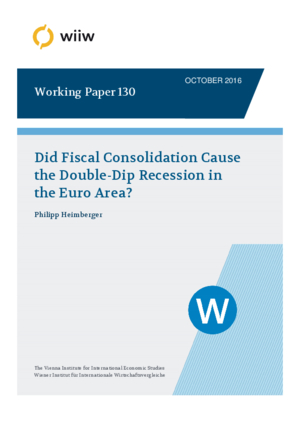Did Fiscal Consolidation Cause the Double-Dip Recession in the Euro Area?
wiiw Working Paper No. 130, October 2016
22 pages including 6 Tables and 2 Figures
Abstract
This paper analyses the short-run effects of fiscal consolidation measures on economic activity in the euro area during the euro crisis. It presents new econometric estimates on the link between cumulative GDP growth and fiscal austerity measures during 2011-2013. The main empirical finding is that the depth of the economic crisis in the euro area's economies is closely related to the harshness of fiscal austerity. Cumulative multiplier estimates are found to vary in a range from 1.4 to 2.1, depending on the data source used to identify the intensity of fiscal consolidation. Given these multiplier values, a reasonable approximation of the size of the output losses due to fiscal austerity in the euro area during 2011-2013 is in the range of 5.5% to 8.4% of GDP. Against the background of the prevailing macroeconomic and institutional circumstances, fiscal consolidation is argued to be the cause of the double-dip recession.
Keywords: fiscal policy, fiscal multiplier, fiscal consolidation, austerity, growth, eurozone
JEL classification: E61, E62, E63
Countries covered: European Union, OECD, Austria, Belgium, Bulgaria, Cyprus, Czechia, Denmark, Estonia, Finland, France, Germany, Greece, Hungary, Ireland, Italy, Latvia, Lithuania, Luxembourg, Malta, Netherlands, Poland, Portugal, Romania, Slovakia, Slovenia, Spain, Sweden, United Kingdom, Australia, Canada, Israel, Japan, Korea, Norway, Switzerland, USA, Bosnia and Herzegovina, Brazil, Croatia, Egypt, Georgia, India, Indonesia, Jordan, Lebanon, Mexico, Morocco, Russia, Serbia, Turkey, Ukraine, EU Eastern Partnership countries, Argentina, Chile, Colombia, Dominican Republic, Ecuador, Emerging market countries, Guyana, Hong Kong SAR, Iceland, Malaysia, Mauritius, New Zealand, Panama, Paraguay, Peru, Philippines, Singapore, South Africa, Taiwan, Thailand, Uruguay, EU-27 (2007-2013)
Research Areas: Macroeconomic Analysis and Policy
